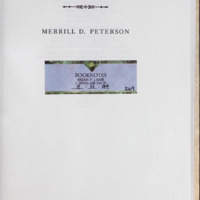-
Title
-
Lincoln in American memory
-
Description
-
Lincoln's death, like his life, was an event of epic proportions. When the president was struck down at his moment of triumph, writes Merrill Peterson, "sorrow - indescribable sorrow" swept the nation. After lying in state in Washington, Lincoln's body was carried by a special funeral train to Springfield, Illinois, stopping in major cities along the way; perhaps a million people viewed the remains as memorial orations rang out and the world chorused its praise. It was the apotheosis of the martyred president - the beginning of the transformation of a man into a mythic hero. In Lincoln in American Memory, historian Merrill Peterson provides a fascinating history of Lincoln's place in American thought and imagination from the hour of his death to the present. In tracing the changing image of Lincoln through time, this wide-ranging account offers insight into the evolution and the struggles of American politics and society - and into the character of Lincoln himself. Westerners, Easterners, even Southerners were caught up in the idealization of the late president, reshaping his memory and laying claim to his mantle, as his widow, son, memorial builders, and memorabilia collectors fought over his visible legacy. Peterson also looks at the complex responses of blacks to the memory of Lincoln, as they moved from exultation at the end of slavery to the harsh reality of free life amid deep poverty and segregation; at more than one memorial event for the great emancipator, the author notes, blacks were excluded. He makes an engaging examination of the flood of reminiscences and biographies, from Lincoln's old law partner William H. Herndon to the poet Carl Sandburg and beyond. Serious historians were late in coming to the topic; for decades the myth-makers sought to shape the image of the hero president to suit their own agendas. He was made a voice of prohibition, a saloon-keeper, an infidel, a devout Christian, the first Bull Moose Progressive, a military blunderer and (after the First World War) a military genius, a white supremacist (according to D.W. Griffith and other Southern admirers), and a touchstone for the civil rights movement. Through it all, Peterson traces five principal images of Lincoln: the savior of the Union, the great emancipator, man of the people, first American, and self-made man. In identifying these archetypes, he tells us much not only of Lincoln but of our own identity as a people. This absorbing book leads us on a revealing tour through our changing image of our greatest president - and our changing image of ourselves.
-
Identifier
-
501796
-
195065700
-
Creator
-
Peterson, Merrill D
-
Source
-
Brian Lamb Booknotes Collection
-
Gift of Brian Lamb, 2011.
-
Catalog record
-
Language
-
eng
-
Date
-
1994
-
Program air date: August 14, 1994.
-
Publisher
-
Oxford University Press
-
George Mason University. Libraries. Special Collections & Archives
-
Text
-
Transcription of Annotations
Notes on half-title: 1953 State of Ill.-Land of Lincoln. William Herndon, Ann Rutledge, Religion, Illegitimacy, Calhoun-father of Lincoln. Underlinings/notes: Underlinings: Lincoln monuments, biographies/biographers, and Lincoln's legacy are underlined. Notes: "Jeff Davis died 1889," "Freeport doctrine," "250 Billion pennies," "70 yrs. after no biography," "Lincoln papers tightly held," Lamb marginalia also chronicles Lincoln's biographers and the discovery and forgery of letters and other documents. "133 movies."
-
Subject
-
"Lincoln, Abraham, 1809-1865--Influence."
-
Relation
-
Original Booknotes interview
-
Rights
-
This work may be protected by copyright laws and is provided for educational and research purposes only. Any infringing use may be subject to disciplinary action and/or civil or criminal liability as provided by law. If you believe that you are the rights-holder and object to Mason’s use of this image, please contact speccoll@gmu.edu.
 501796.pdf
501796.pdf